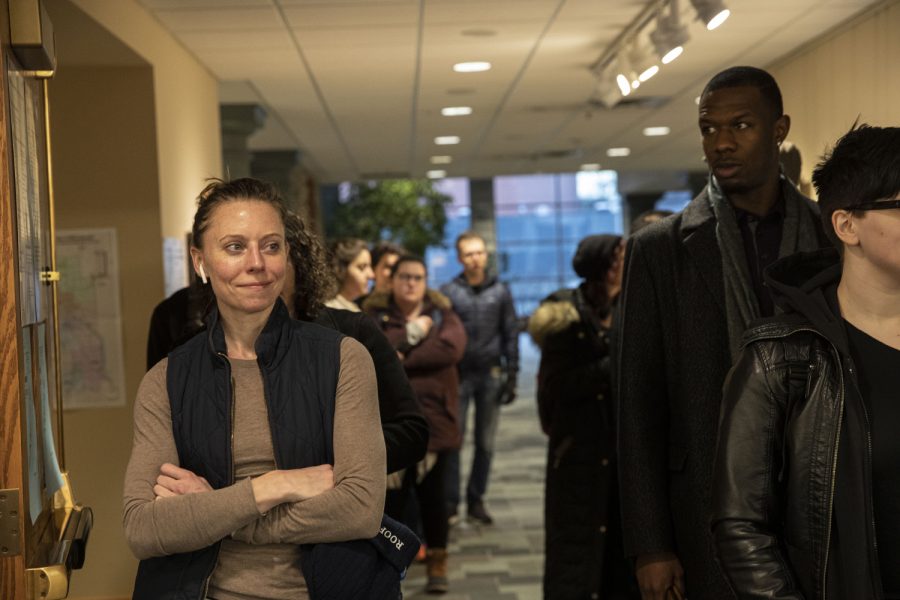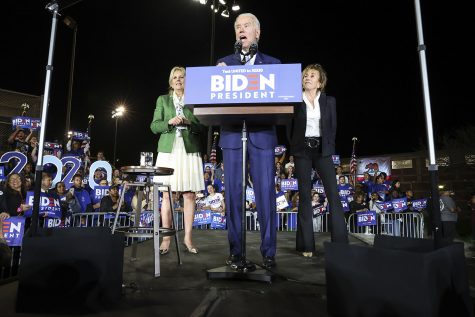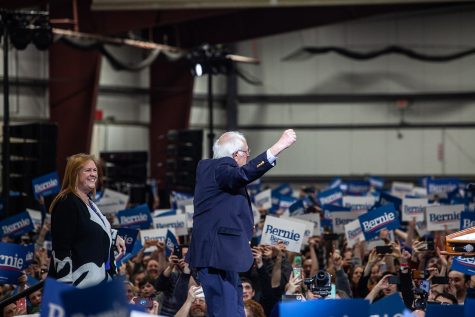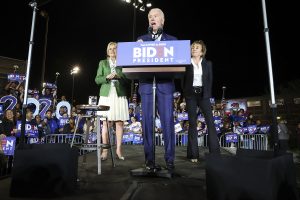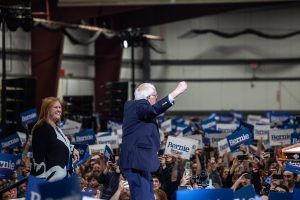Joe Biden wins Minnesota primary after endorsement by home-state Senator Amy Klobuchar
Former Vice President Joe Biden won the most delegates in the Minnesota primary on Tuesday, edging out Sen. Bernie Sanders, I-Vt. Voters in the state said various factors influenced who they voted for — including the end of Sen. Amy Klobuchar’s campaign.
Voters line up outside the polling location at Westminster Presbyterian Church for the Democratic Primaries in Minneapolis, MN on Tuesday, Mar. 3, 2020.
March 4, 2020
MINNEAPOLIS — Former Vice President Joe Biden won the Minnesota Democratic primary election on Super Tuesday, just a day after Sen. Amy Klobuchar, D-Minn., dropped out of the race and endorsed him.
Biden won 38.4 percent of the vote in Minnesota with 85 percent precincts reporting by press time, while Sen. Bernie Sanders, I-Vt. won 30.2 percent of state support. While some Gopher State voters said they were forced to change their vote after Klobuchar ended her campaign — and took into consideration her endorsement of Biden — others said they were surprised Klobuchar made it as far as she did and opted for other Democratic candidates.
Minnesota voter Kevin Wong, 37, said he supported Biden in the presidential primary in Minneapolis on Tuesday. In addition to health care, Wong said he looked for a candidate with realistic goals.
“I think just being realistic about what’s achievable was something that was really important to me,” Wong said. “And so, being able to understand which candidates are putting out massive ambitions versus achievable, near-term goals was for me, I’d say, the greatest focus.”
When the news broke that former South Bend, Indiana Mayor Pete Buttigieg and Klobuchar were dropping out of the race, Wong said he had to change who he was voting for in the primary election.
“I continued to turn to the focus of just who is going to be able to beat the incumbent president,” Wong said.
He added that he believed Klobuchar had gained a lot of traction in her home state, and that her and Buttigieg ending their White House bids influenced his decision to vote for Biden “a little.” The two former candidates endorsed Biden after bowing out of the nomination race themselves.
“I think her record in the elections here have been really positive in terms of gaining wide support across both parties,” Wong said.
Doug Duea, 50 and a Minnesota voter, said he was planning to vote for Klobuchar before she ended her campaign Monday. Her endorsement of Biden did not lead him to vote for the former vice president, however, and ultimately his decision would be based upon the candidates platform, actions, demeanor, and more, Duea said.
“It was a little disappointing,” Duea said of Klobuchar’s departure from the presidential primary race. “But I understand that … Our system’s not set up necessarily for everyone to run. You’ve got to have lots of money, and if you don’t catch it early it’s pretty tough to catch the wave early to keep that going.”
Duea, who rode his bike to the polls, said the green economy is one of many issues that influenced his vote in the primary election. Issues that seem to be swept under the rug because they’re not “sexy” such as health care for all, Duea said, also affected his decision.
“For me, it’s basic, civil, human liberties,” Duea said. “… What many of us take for granted.”
Loretta Barbieri, 48, said this was her first time voting in the primary election, and her primary purpose was electing a viable nominee to compete against President Trump. Barbieri said she liked and voted for Sen. Elizabeth Warren, D-Mass.
“I just really don’t like a lot of what Trump is doing — a lot of the things he’s getting rid of,” Barbieri said. “That’s enough motivation for me.”
An election official in Albert Lea at United Methodist Church, Annette Williams, 62, said the ballot listed any candidate still registered by Dec. 31, 2019 when they were produced. She was interested to see what kind of support candidates who were no longer in the running may still garner from early voters and Super Tuesday voters alike.



